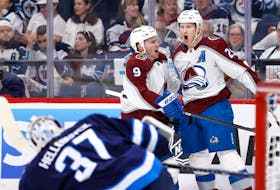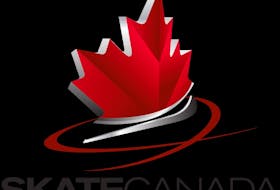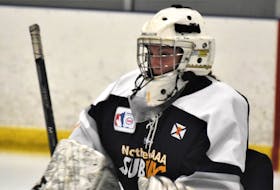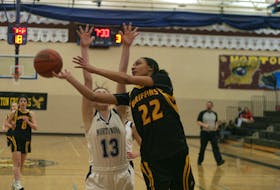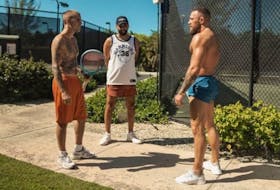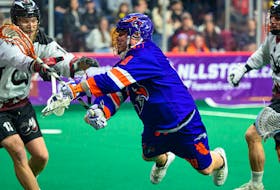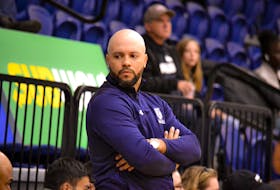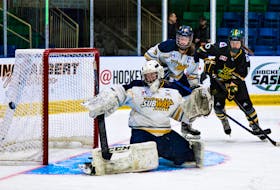Gary Simmons remembers sitting in his parents’ house in Lethbridge, in the midst of a hot Alberta summer, looking at his shiny new police badge and the gun he’d just been issued.
When the phone rang.
He remembers it because it was the first time Simmons — he was 21 — had cursed in front of his mother.
“I said, ‘Newfoundland!? What kind of God-damned hockey do they have there? You trying to bury me?’” he recalls 52 years later.
Simmons, then one of the best goalies in western Canada not playing in the NHL, had angered the Detroit Red Wings, the team which owned his NHL rights.
In those days, it was not wise to upset the parent club if you were a hockey player.

Gary Simmons, now 73, was born in Charlottetown, P.E.I., but proudly considers himself a westerner, having grown up in Lethbridge.
An all-star goalie coming up through the ranks, Simmons played three seasons of junior hockey in Edmonton, helping lead the Oil Kings to the 1965 Memorial Cup final, where they lost to a Niagara Falls Flyers team backstopped by Bernie Parent and featuring a young Derek Sanderson up front.
The Oil Kings were, in those days, controlled in part by the Red Wings, meaning Detroit controlled Simmons’s destiny.
“When I got out of junior, Detroit signed me, which was indentured slavery back in those days,” he said. “They owned you as long as they wanted you.”
Simmons attended Detroit’s training camp in the fall of ’65 — “all bright eyed and bushy tailed” — and by all accounts handled himself well, staring down the likes of Gordie Howe, Alex Delvecchio and Normie Ullman.
Long story short, the Wings wanted to send Simmons to Johnstown of the Eastern league, and he found out the decision was made before camp even opened.
Nothing against Johnstown, but the travel schedule was brutal, even for a kid coming out of the Western junior league.
“I told them in Detroit, I’ll go to Johnstown, but if I don’t like it there, I’m not staying,” he recalls. “I didn’t like it there, and I didn’t want to stay. I told them to call Detroit and get me out.
“Back in those days, when you did what I did, you were on the black list.”
No kidding. Imagine, management must have wondered, this snot-nosed kid from Lethbridge dictating to the Detroit Red Wings.
Simmons did play that year, bouncing between Port Huron, Mich. — which was actually affiliated with the Chicago Black Hawks — Des Moines, Iowa and Toledo, Ohio.
“Detroit would come to Port Huron every year there to play an exhibition game even though it was Chicago’s minor league team,” he says. “It was only 50 or 60 miles away. They didn’t even let me play half the game. Against my parent club.
“So, I got hold of Detroit again and said, ‘I want out of here.’”
A few months later, Simmons is home in Lethbridge and he knows he’s done it now. He’s pissed off the Red Wings so much, he’ll never see the light of day in an NHL rink.
He had a few buddies in town who were cops, so Simmons figured why not? The money, $425 a month, wasn’t bad.
He went to the local police station, met with the staff sergeant, completed a psychology test and was given a couple of uniforms and a gun.
He was told to start the four o’clock beat that day.
When the phone rang.

Detroit wasn’t stupid. As much as Simmons was being a pain in the butt, he was still a pretty good goalie, good enough for the Wings not to turn their back on him entirely.
Simmons thinks it might have been a chap named Mitchell — it certainly wasn’t Sid Abel, the Red Wings’ coach — who was pitching the idea of playing in Newfoundland. Detroit, of course was familiar with the Newfoundland Senior Hockey League because that’s where Alex Faulkner, who had worn the winged wheel a few years previous, had been groomed.
After the initial shock, he was actually giving it some consideration when another call came.
“It was from George.”
George Faulkner, Alex’s older brother and a former Montreal Canadiens farmhand who had just come off starring for Canada in the 1966 world championship, was the player-coach of an outfit known as the Conception Bay CeeBees.
The CeeBees had lost the all-Newfoundland senior hockey championship — the Herder Memorial Trophy — the previous spring after winning in 1965, and Faulkner was looking to sure up his goaltending.
He knew he had a good one in Simmons, if only he could lure the Albertan east.
“George offered me $150 a week, which was good money,” Simmons says. “I told him about the police force, and I was serious about it. My buddies are telling me I’m going to love it.
“He said, ‘What’s it going to take to get you here?’ I said, ‘$310 a week.’ George says, ‘Lord geez b’y, I’m the coach and I don’t make that much!’ I said, ‘Well, you asked me.’”
Faulkner had to talk it over with Frank Moores, who ran the CeeBees then before going on to become premier of the province.
Couple of minutes later, Faulkner got back to Simmons.
The CeeBees had a new goalie.
The 1960s was quite an era for goaltending in the Newfoundland Senior Hockey League. Four goalies — Simmons, Lyle Carter, Andy Brown and Doug Grant — would go on to play in the NHL. A fifth, Jean-Guy Morissette, played a couple of seasons in Grand Falls-Windsor in the early ’70s after playing in the Canadiens’ system, and getting into one game with Montreal.
Though it’s debatable who was the best of the five, Simmons made the most starts and registered the most wins in the NHL. But not before a three-year run in Harbour Grace, backstopping the CeeBees to the 1967 Herder.
“For me, it took some getting used to, but I really enjoyed it in Newfoundland,” he said. “I really liked the people. I loved my teammates. It was a very enjoyable three years.”
The CeeBees got their money’s worth from Simmons, as he missed only three games over three seasons, and while his numbers may not support the claim — his goals against average over the three seasons was 4.79 — he established himself as the best goalie in provincial senior hockey.
During one game in the ’67 Herder final against the Gander Flyers, Simmons made 51 saves.
“It was really wide-open hockey,” he said. “It was not a defensive league at all.
“It was about scoring goals and you had guys like Jacques Allard and Danky Dorrington, and as I remember, the scores were like 6-5 or 7-6. You didn’t worry about your goals against average, you just worried about letting in one less goal.”
Simmons means it when he says he enjoyed his time in Newfoundland, but there is a tinge of regret, too, in that he figures it cost him five or six years in the NHL.
“I was making more money in Newfoundland than I would have been in San Diego or Des Moines or Johnstown, and I was playing 40 games as opposed to 70,” he said.
“I was too young to understand the game back then. I’m thinking I’m making this money now, this is a better deal.”
After returning to play in the Alberta senior circuit with Calgary in 1969-70, Simmons played four years of minor pro before getting his break.
He was toiling with Phoenix of the Western league when the Roadrunners were in Salt Lake City for a game.
“I knew the trainer in Salt Lake, and he called and asked me to meet him for a coffee,” Simmons recalls. “He said, ‘I can’t say which one, but I can tell you there’s an NHL team interested in you.’ I said, ‘Tell me this, is their farm team in Salt Lake City?’ He nodded his head.”
The California Golden Seals, one of the six expansion teams brought into the NHL in 1967, had their farm club in Salt Lake City.
Simmons, for the first time, elected to hire an agent. By the end of the 1974 season, the Roadrunners were preparing to join the fledgling World Hockey Association the next year.
They wanted Simmons to come along, but instead, he signed with the Golden Seals.
After five seasons toiling in the minors, and four in Canadian senior amateur hockey, Simmons made his first NHL start on Oct. 11, 1974, seven years after leading the Conception Bay CeeBees to the Herder Memorial Trophy championship.
What’s more, he shut out the Atlanta Flames 3-0.
Simmons would appear in 34 games that season, going 10-21-3 with Gillies Meloche getting in 47 games. The next year, the two would split the workload and Simmons was 15-19-5 with a 3.33 GAA on a Seals team that would relocate to Cleveland the next year.
He would split the next season with the Barons and Los Angeles Kings before finishing up his NHL career in 1977-78 as Rogie Vachon’s backup in L.A.
During his brief four-year NHL career, Simmons was probably best known for his goalie mask. He was the ‘Cobra,’ a nickname that still sticks today, and his mask featured a large cobra snake.
“I was in Phoenix, and a reporter came in after the game — he’d never seen me play before — and he said, ‘You got a different style out there … you were like a snake on the ice.’
“Bobby Barlow was sitting next to me — his nickname was ‘Blah Blah’ because he talked all the time — and he says, ‘Yeah, he’s just like a cobra.’
“That was in the paper the next day, and it stuck. Since 1972.”
Simmons hasn’t kept in contact with his old CeeBees teammates much. He chatted with George Faulkner a couple of years ago, and called Jim Penney for he and his wife’s 50th wedding anniversary.
“I betcha it was five minutes before he believed it was me,” Simmons chuckles.
Someday, he says, before he gets too old, he’d love to ride his motorcycle from Lake Havasu City, Az., on the California/Arizona border where he’s been living for the past 16 years, to Harbour Grace.
“It was, and always will be, a special place for me,” he said. “It was a special time.”
Robin Short is The Telegram’s Sports Editor. He can be reached by email [email protected] Follow him on Twitter @TelyRobinShort

